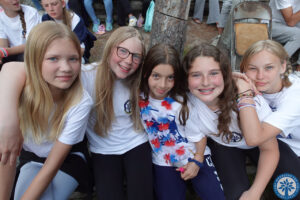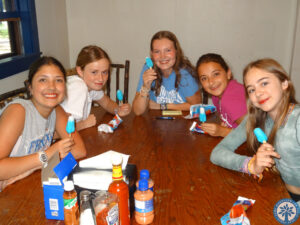Category: New Parent Information
Parents and Campers Share “Soaring Free” Moments
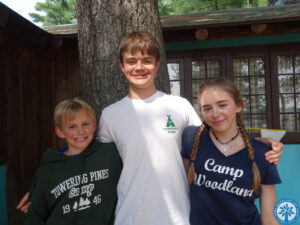 A BIG thank you to our camp families for taking the time respond to our end-of-season survey and giving valuable feedback about the recent summer so that we can continue to improve as we make plans for 2024. Our theme this summer was “Soaring Free in ’23,” and from the comments we received from parents about the transformations being noticed at home after spending time with us, it obvious that your camper/s soared quite high!
A BIG thank you to our camp families for taking the time respond to our end-of-season survey and giving valuable feedback about the recent summer so that we can continue to improve as we make plans for 2024. Our theme this summer was “Soaring Free in ’23,” and from the comments we received from parents about the transformations being noticed at home after spending time with us, it obvious that your camper/s soared quite high!
PARENT PERSPECTIVE
 Because our survey responses come together for both Woodland and Towering Pines, and many camp families have children at both, they are co-mingled here:
Because our survey responses come together for both Woodland and Towering Pines, and many camp families have children at both, they are co-mingled here:
Our daughter has become more adventurous with her food choices which is great! They are both learning to be more independent and try new things.
As every summer, the kids have come home more independent and mature. This year, they also seem closer to each other since they were both in coed show and got to share that experience.
Our son seems a lot more mature; we can tell that he’s gained life perspective and is not as addicted to devices which is great. He’s been much more talkative with all of us and he’s gained significant skills in meeting new people on his own and talking with them.
**I see them more talkative and they both seem really happy with their experiences. **Maturing and willingness to work hard on goals. **More confident, social, self confident, mature. Growth. ** Both kids are more capable, independent, and embracing of challenges. Also, they seem to have a more mature attitude about life. ** Confident (!) and able to walk into situations with unknown kids/adults and not feel overwhelmed! **
 ** Independence in our daughter. Compassion and inclusion in our son. **Increased confidence, independence, and adventurousness. ** Increased confidence, trying new things. ** More confidence around tennis. ** She is now officially a camp kid! Loved it! **Self esteem, open to try new things. ** He’s become more active and is eating better. **
** Independence in our daughter. Compassion and inclusion in our son. **Increased confidence, independence, and adventurousness. ** Increased confidence, trying new things. ** More confidence around tennis. ** She is now officially a camp kid! Loved it! **Self esteem, open to try new things. ** He’s become more active and is eating better. **
** Better sense of self. ** She is more of a leader and doing things outside her comfort level. ** He is more confident, has more independence, smiles more and more often. ** I can see that he is more open, he gained self confidence, and made new friends. ** Confident, healthy, happy, and I can’t wait for her to go back so she gets a break from her phone obsession (ha!). **
CAMPER PERSPECTIVE
Towards the end of camp, each girl had the opportunity to share her thoughts on what “soaring free in ’23” looked like (all campers whose form we received are included here):
Audrey: trying new things and making new friends, being a good friend; Amelia: making new friends that are different from me; Evie: meeting new friends, fun; Jaclyn: trying new things and being myself; Eleanor: trying really hard in all of my activities; JoJo: having a lot of fun with all of my friends at camp; Luci: trying new things; Georgia: trying new things and being kind and open to everybody; Fiona: having fun at camp with new activities; Oli: trying oatmeal and new activities
Silver Birch
Alice: first time going to a sleep away camp that I really liked and felt like I grew at; Elyse: trying new foods and activities, making new friends; Clara: being myself and having fun (and MUCH, MUCH MORE!); Masyn: in the breeze was an eagle so kind and he helped me find this place; Lia: having fun and being myself; Mojo: learning space; Roberta: nice, welcoming, happy; Ana Roberta: mi verano esta muy paque y escanlar; Maya (CIT): trying my best
Eloise: a girl trying new things; Maggie: I tried kneeboarding; Olivia H: trying new things; Casilda: I tried riflery and archery, and I also really like dance; I love my counselors and cabin; I love tennis and sailing; Renata: fun and awesome; Camila: being at camp; Dani (CIT): amazing – I made a lot of good friends, and I want to keep in touch with them…it was a break from home
Driftwood
Hannah: great!; Orla: fun and free to be me; Maddie H: trying new things and achieving stuff in 2023; Amelia: passing up to my blue archer; Maddie B: trying new things; Nat (CIT): enjoyable, fun, new
Hilltop
Julia: fun, trying new things and being friends with new people; Regi: wonderful, new chances and a lot of fun!; Natalia: fun, unforgettable and joyful; Olive: meeting new people and doing things I would never do; Sophia: being yourself without being judged, being able to be who you are, brave, confident; Casi: a really fun summer that I loved a lot; Taylor: learning new things and starting new beginnings; Tess (CIT): enjoying my activities for the activity and not the level
Zoe: it was great, and I progressed so much; Alix: learning a lot in riding; Stella: being my most authentic self and finding activities that make me happy!; Amelia: experiencing new things, making new friends and starting new beginnings; Phoebe: being myself and being brave; Clara: fun, loving, and super filled with friends; Olivia: learning how to shoot in riflery; Sydney: passing levels; Isabella (CIT): being myself and having fun
Treetops
Vale: a great year with all my friends while enjoying the activities that I love to do the most; Marion: fun, friendly, free, amazing; Lizzie: having soooooo much fun; Bella: getting to meet new people and trying new things; Izzy: doing the activities that I like and having a great cabin; Elizabeth: one of the best years ever!; Katherine: just living life with amazing friends and things to do without stress or anxiety
Sofia: a great opportunity to try something new; Delia: being on the water and enjoying sailing; Lou: learning a ton in sail race; Lizzy: having fun; Lizzie: being open to others sharing feelings and being free in spirit; Kaitlyn: hanging out with friends and learning how to be a good CIT; Lilah: having fun and slaying every day
ENROLL for SUMMER 2024
While feelings are at an all time high from the summer, now is a GREAT time to enroll your camper/s for 2024 and reserve your spot/s before we open registration for new campers. The early bird discount ($750 deposit, 5% off 2024 rate) for all returning campers has been extended through 9/8/23 when registering for 6 weeks: https://cwtp.campbrainregistration.com
Befriending Fears at Camp
 I was an anxious kid. Life, for me, meant constantly fighting an incessant stream of questions like what if that plagued my mind. But there was an escape–spending the summer at Camp Woodland. At camp I took six activities, the same every year: swimming lessons, free swim, riflery, archery, tennis, and horseback riding. The familiarity of my camp routine distracted me from facing anything unknown. There was a simplicity in my regimen that I clung to for most of my early summers. I never wanted to try any new activities for fear of embarrassment and failure. So, I stuck to what I knew. My activities were like old friends. I knew them blind. That worked perfectly for three summers, until my fourth year, when I was placed in a more advanced horseback riding hour and my little world flipped on its head.
I was an anxious kid. Life, for me, meant constantly fighting an incessant stream of questions like what if that plagued my mind. But there was an escape–spending the summer at Camp Woodland. At camp I took six activities, the same every year: swimming lessons, free swim, riflery, archery, tennis, and horseback riding. The familiarity of my camp routine distracted me from facing anything unknown. There was a simplicity in my regimen that I clung to for most of my early summers. I never wanted to try any new activities for fear of embarrassment and failure. So, I stuck to what I knew. My activities were like old friends. I knew them blind. That worked perfectly for three summers, until my fourth year, when I was placed in a more advanced horseback riding hour and my little world flipped on its head.
 I had ridden horses for three summers by then, but the prospect of being in the advanced hour, surrounded by older, skilled riders, made me so anxious I felt sick. I had caught glimpses of the pasture during these sessions and seen blurs of beige and brown, clouds of kicked-up dust, and what seemed like impossibly fast speeds. I was certain that the second I mounted any horse going that fast I would be flung off and land somewhere in the trees.
I had ridden horses for three summers by then, but the prospect of being in the advanced hour, surrounded by older, skilled riders, made me so anxious I felt sick. I had caught glimpses of the pasture during these sessions and seen blurs of beige and brown, clouds of kicked-up dust, and what seemed like impossibly fast speeds. I was certain that the second I mounted any horse going that fast I would be flung off and land somewhere in the trees.
My first day in riding left me in tears. I already felt miles behind my peers. I trooped, defeated, back to the cabin, and I was in no mood to unpack the day with my friends, so I sat on the porch in the sinking sunlight alone. The door creaked open and my live-in CIT, a girl named Arantxa, sat beside me. She introduced herself, but said nothing. I was grateful for the silence. Her presence was comforting enough, as if she was letting me though she was there for me. She would wait until I was ready to talk.
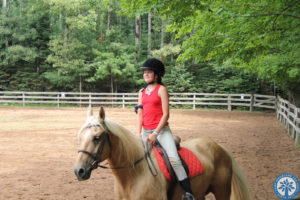 Day after day, I wandered out to the porch. When I felt like crying after being reminded again and again I was the worst in my class, I found some semblance of solace on the rickety cabin steps. Arantxa came out and sat with me every day. Eventually, I began to tell her about riding and my debilitating fear each time I walked into the barn. I confessed I wanted to quit. She frowned. “The fear you have,” she said, “is not something to run from. You have to accept your fear. Live with it. Free it, and it will make you better. Don’t quit riding because you’re scared. Just keep going.”
Day after day, I wandered out to the porch. When I felt like crying after being reminded again and again I was the worst in my class, I found some semblance of solace on the rickety cabin steps. Arantxa came out and sat with me every day. Eventually, I began to tell her about riding and my debilitating fear each time I walked into the barn. I confessed I wanted to quit. She frowned. “The fear you have,” she said, “is not something to run from. You have to accept your fear. Live with it. Free it, and it will make you better. Don’t quit riding because you’re scared. Just keep going.”
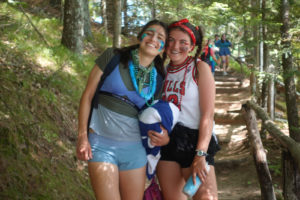 Those words kept me enrolled in riding for the next six weeks. She was right, I was afraid–that never went away. But Arantxa helped me befriend my fear. I made peace with it, and understood that its very existence was proof that I was growing. Growth, I learned, was not what resulted from natural skill or prowess. It was earned from that uncomfortable in-between, that space where what if still pestered me. But this time I was armed with the tools to twist what if into something powerful. Something hopeful. Instead of asking, what if I fail? I found myself asking, what if I succeed?
Those words kept me enrolled in riding for the next six weeks. She was right, I was afraid–that never went away. But Arantxa helped me befriend my fear. I made peace with it, and understood that its very existence was proof that I was growing. Growth, I learned, was not what resulted from natural skill or prowess. It was earned from that uncomfortable in-between, that space where what if still pestered me. But this time I was armed with the tools to twist what if into something powerful. Something hopeful. Instead of asking, what if I fail? I found myself asking, what if I succeed?
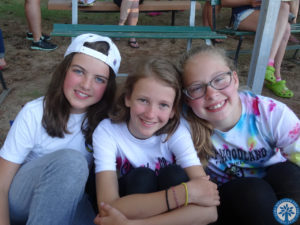 We had a horse show on the last day of camp to demonstrate all of our acquired skills. I mounted my horse, welcoming the flutter of anxious butterflies in my gut. Scanning the crowd, I saw my friends beaming at me. But something else caught my attention: Arantxa, breathless from running to escape her CIT duties, stood at the fence with a handmade sign drawn just for me. She waved and smiled, and warm pride bloomed inside my chest. As I rode around the arena, I felt like a blur of beige and black, fast and flying, ready to take on the world. I knew then that I could conquer any activity, any obstacle, and any challenge in my way.
We had a horse show on the last day of camp to demonstrate all of our acquired skills. I mounted my horse, welcoming the flutter of anxious butterflies in my gut. Scanning the crowd, I saw my friends beaming at me. But something else caught my attention: Arantxa, breathless from running to escape her CIT duties, stood at the fence with a handmade sign drawn just for me. She waved and smiled, and warm pride bloomed inside my chest. As I rode around the arena, I felt like a blur of beige and black, fast and flying, ready to take on the world. I knew then that I could conquer any activity, any obstacle, and any challenge in my way.
This blog was originally written by Molly K as an influential figure essay for a college-prep English class assignment. We are excited to have Molly join our staff team in 2023!
Camp…More Than Ever
 Hello from Camp Woodland! We are SO EXCITED to be open for the summer 2021 season! You might say that we have been a little busy (hence the delay on getting our first blog out this week!). After months of planning, and really two years of thinking about how camp would be this summer, opening day arrived. Finally, we were able to welcome girls to camp, introduce them to all the other amazing campers and staff members that make up this community, and begin to experience all the special aspects of camp life. “More than ever” seems to be an appropriate phrase. Given the feelings of loss, and many struggles imposed upon everyone by the pandemic, we all need camp more than ever.
Hello from Camp Woodland! We are SO EXCITED to be open for the summer 2021 season! You might say that we have been a little busy (hence the delay on getting our first blog out this week!). After months of planning, and really two years of thinking about how camp would be this summer, opening day arrived. Finally, we were able to welcome girls to camp, introduce them to all the other amazing campers and staff members that make up this community, and begin to experience all the special aspects of camp life. “More than ever” seems to be an appropriate phrase. Given the feelings of loss, and many struggles imposed upon everyone by the pandemic, we all need camp more than ever.
The time outside, the laughter and smiling faces, the closeness of friendship, the hilarious silliness, the opportunity for fresh, real-world (tech-free) experience— yep, more than ever. You can already see it on the girls’ faces and hear it in their voices. They’re so happy to be here, so ready to play, to be carefree kids, and to enjoy the fun of camp. For the staff too, they missed this place and the simpler, more genuine life camp provides. This has always been true at Woodland, summer after summer, but this year, it’s even more so.
Thank you parents for helping make opening day go as smoothly as possible! Your attention to the details of our pre-camp protocols and instructions (so many forms! emails! messages!) really helped. We especially appreciate all the effort you put into keeping your camper/s healthy before arriving. We know some things were added burdens, but we think it was well worth the benefit it provides the whole camp community. So, THANK YOU!
One worry about this new procedure was that the campers would not have their parents to help settle them into their cabin. From the camper’s point of view, this turned out to be unjustified. This allowed everyone to set up their bunks together. A fun new group project was born, with the counselors and bunkmates helping make the whole cabin more comfortable. It’s amazing what colorful blankets, stuffed animals and a few personal items can do to make the cabin feel like “home”. And, we were able the launch the whole cabin group into action right away. A great thing!
 As campers arrived, cabin groups enjoyed playing various games and exploring the main areas of camp. Having Dan’s famous mac-n-cheese for lunch was a much anticipated treat. Over the years this has become a favorite opening day meal because it is a true crowd pleaser. I think the secret is that mac-and-cheese is “comfort” food and makes campers feel like they are in a familiar place. And, because it was Saturday, there was pizza for dinner (double YUM)!
As campers arrived, cabin groups enjoyed playing various games and exploring the main areas of camp. Having Dan’s famous mac-n-cheese for lunch was a much anticipated treat. Over the years this has become a favorite opening day meal because it is a true crowd pleaser. I think the secret is that mac-and-cheese is “comfort” food and makes campers feel like they are in a familiar place. And, because it was Saturday, there was pizza for dinner (double YUM)!
Over these first several days, time as a cabin has been important for creating a supportive group dynamic. General rules and good habits for getting along in such close living quarters are discussed and camper input is requested (better buy-in when you are able to help make the “rules”!). They have been working on “cabin contracts” that can help address disagreements and guide their interactions positively. For example, a cabin may agree that you should ask permission before sitting on another person’s bed as part of showing respect.
The lake was a popular spot on Opening Weekend! The lifeguards and cabin counselors of course took time to explain the safety procedures of the waterfront area and answer everyone’s questions about how to make the most of the swimming opportunities at camp— the raft, diving board, “floating” mats, log roll, tubing, Big Banana and other fun free swim activities. Is the water cold?! We always choose to say that it is “refreshing!”
At its core, camp is about connection. It’s about taking a break from our screens, and discovering the beauty of nature that’s been there all along. It’s about the joy of friendship found in simple shared experience. In these ways and others, camp is such a relief. And yes, this summer, that’s true more than ever!
Reference: RBC
Summer 2021: A Time to Dip Your Toes in the Socialization Pool
After more than a year of quarantines, restrictions, isolation, reduced/weird social interactions, etc., we know that kids desperately need socialization with their peers. We are also aware there is a concern out there from students heading to any school that will be in-person next year (including college) that they will face almost full/constant socialization (classes, cafeterias, sports and other activities, buses, dorm rooms) and need to be “on” all the time after this past year of having almost zero socialization and being “off” all the time.
Those who are fortunate enough to go to camp in general and this summer specifically, will be able to dip their toes in the socialization pool. They will get to practice interacting more regularly with peers before facing their next school year. This will be especially beneficial for those kids who have had an especially isolating year at home and/or are facing a big transition next year. This could be going to a new school, whether because of regular advancement (middle to high school, for example), moving, or other life change.
The good news is that this practice of interacting with peers will be a gradual process at Camp Woodland this summer. Campers will not be thrown into the deep end of the socialization pool without adjusting to shallow water first. Because the first few days of camp will have us sticking to our cabin pods, this will allow a unique opportunity for campers to test the waters of a small group before diving in with the great camp community after our “bubble” has been established.
IT ALWAYS STARTS WITH THE CABIN GROUP (THEN AND NOW)
The cabin group at Woodland has always been one of thoughtful intention and purpose (even pre-pandemic). There are 2-3 counselors who will be carefully selected as a team to work with each age group. Together they establish the culture within the cabin so that campers feel welcome, comfortable and cared for. They will choose a cabin theme that represents their group and will clean and decorate the cabin to make it feel “homey” and inviting. Each camper will have “space” to make their own on a top or bottom bunk and designated places store their “stuff”. The counselors will be ready to help campers navigate unpacking and settling in which is an important step for acclimating to their summer home.
The counselors will be trained during their 2-week pre-camp orientation on group dynamics and will have a back pocket full of fun games and activities to start the process of evolving their cabin group (6-10 girls of similar age) into a community (a unified body of friends). This does not happen overnight, of course, but these intentional activities over time will help campers in the same cabin make introductions and connections, establish a code for group living, create a framework for communication, and provide opportunities for teamwork and trust.
COMING TOGETHER IS A BEGINNING (TOES INTO THE WATER FIRST)
The initial few days for all cabin groups are a time for campers to get to know one another and adjust to their new environment. Both returning and new campers are eager to see what camp is about, to make friends, and to belong. Counselors will help campers make introductions and find connections with others in a nonthreatening way. Name games, ice-melters, and other get-to-know-you activities assist campers in discovering commonalities with each other at a surface level until the group is ready to share at a deeper level.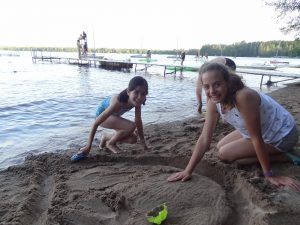
We find that campers often stick with what is comfortable and familiar at the beginning when getting involved in the camp program (moving close to the water but not getting wet). This is perfectly OK. They will have the opportunity to branch out more as the summer unfolds and their comfort and confidence levels increase. The start of the camp season is the golden opportunity for counselors to set expectations and establish routines for cabin group meetings and discussions that will be the building blocks for future work and play together.
The fun of camp is just beginning – toes are being dipped into the socialization pool!
KEEPING TOGETHER IS PROGRESS (WADE IN A LITTLE FURTHER AND GET SPLASHED)
Once toes are wet and a foundation is in place, campers are ready to wade further into the water. Here we will gradually introduce mingling with others outside the cabin group for activities and other camp events. Campers will be eager to explore and try new things. Activities will be designed that allow them to do this in an age-appropriate way.
Campers may be ready to go beyond the surface and share on a more meaningful level after spending quality time and having frequent interaction with their cabin group. Guidelines will be established by the counselors so that each person has a chance to participate equally and fairly. The important work of practicing communication skills will take place, especially sharing and listening, so the group is able to have a peaceful discussion when things aren’t going so well and to work through issues as they arise.
Camp is even more fun after wading in further and getting splashed a bit!
STAYING TOGETHER IS SUCCESS (DIVE IN DEEP)
 Once a group has experienced the success of moving past challenging times and is working well together, they will enjoy their cohesiveness and move into deeper water. Being in the “deep end” typically means that groups have the ability communicate well, work as a team, and trust each other. Campers will exhibit confidence and independence and stand taller than they did at the beginning of their camp experience. (If you don’t believe me, look at camper photos at the beginning and end of a session — the change can be remarkable!)
Once a group has experienced the success of moving past challenging times and is working well together, they will enjoy their cohesiveness and move into deeper water. Being in the “deep end” typically means that groups have the ability communicate well, work as a team, and trust each other. Campers will exhibit confidence and independence and stand taller than they did at the beginning of their camp experience. (If you don’t believe me, look at camper photos at the beginning and end of a session — the change can be remarkable!)
The best of each camper will combine to form a strong team, and it can be difficult for them to go their separate ways after taking this journey together. It is amazing how strong those bonds can be, especially when campers stay for a longer period of time, because of the growth that is made after reaching the other side of struggles and conflicts. This intentionality fosters the evolution of a group of campers into a unified community. Counselors will help campers put closure on their camp experience and transition to what comes next (returning to home and school).
Camp is the most fun at the end because of taking a deep dive with the friends who are now family. Campers will have had lots of practice interacting with their peers over the course of the camp season and will leave with confidence to face the next school year!
Thank you to Liz Kunkle for suggesting this topic and giving examples of what kids will be facing in the months ahead (see first two paragraphs)!
Reference: acacamps.org/resource-library/camping-magazine/slinky-smurf-evolving-groups-communities
The Blessing of the Least Favorite Activity
Wendy Mogel’s best selling book, The Blessing of a Skinned Knee, resonates with parents and camp leaders alike. Dr. Mogel has spoken at camp conferences over the years, and she continues to be active in the camp community. If you haven’t had a chance to read The Blessing of a Skinned Knee, we highly recommend it. In addition to sharing about the importance of letting our kids take healthy risks, and not always rescuing them from failure, Mogel gives many other valuable insights. She has recognized the value of camp experiences in the development of emotionally healthy kids, as you can read in the article “Camp Blessings” on her website.
A question we often get asked, especially by kids who haven’t yet been to Woodland, is “What if I don’t want to do an activity?” Sometimes it starts with a statement, “I don’t like horses or I’m not good at tennis. Do I have to do that activity?”
Our answer to that question is that you don’t HAVE to take a particular activity, and this year we will also say that you GET to go with your cabin group and will be encouraged to TRY most activities. Because the first few days of camp will have us sticking to our cabin pods, this will allow a unique opportunity for campers to really see firsthand what each activity is about (instead of relying on their own preconceived notions or parent influence) before committing to a schedule of 6 activities for a 2-week period.
There are several reasons kids are reluctant to do a particular activity, and they are the same reasons why adults often choose to forgo some recreational options:
1. A previous negative experience with the activity, usually not at camp and not with experienced instructors.
Falling off a horse, not getting up on water skis after several tries, or getting rained out on a camping trip are all examples of negative experiences that make a person naturally inclined not to want to try again.
2. Fear!
Fear of being humiliated. Fear of failure. Fear of heights. Fear of lake water. Fear of animals. Fear of going to the bathroom in the woods. Fear of getting hurt. The list goes on and on.
3. Based on their perception of themselves or their past successes/failures, they think they won’t like it.
No point in giving an activity another go if it is not in their normal repertoire of things youth like and/or are good at. It is also our experience that kids often think they should be proficient at something on the first try. If an activity was attempted at one time with minimal success, then the activity is often taken off the list completely for future consideration.
There are other reasons for kids to not want to do an activity, but these are three that readily come to mind from what campers have told us over the years. Interestingly, the reasons kids don’t want to do an activity are the very reason for trying the activity and may be the best thing that happens at camp for that camper.
If a child doesn’t want to do an activity because of a previous negative activity, trying it at camp could lead to either a changed mind (and a new activity they like) or, at the very least, a not-as-negative experience to remember. We believe that “it takes a lot of slow to grow” and that it may take time (and failure) before experiencing success. Woodland staff are good at breaking down various skills and recognizing incremental progress – no matter how small the “win”. They also measure success by the ruler of the individual and not someone else’s ruler.
If a camper doesn’t want to do an activity because of fear, then trying the activity could be the most life-changing event that occurs for that camper during their camp stay. Overcoming fears and challenging oneself to attempt something that seems impossible can lead to great feelings of accomplishment and improved confidence. With the support and encouragement from cabin mates and counselors, campers feel on top of the world after successfully trying something they feared.
For the camper with a fear of maneuvering a sailboat on a windy day, getting in a boat day after day with a qualified instructor and learning the necessary skills in more manageable conditions will go a long way towards building self-assurance. Small steps lead to bigger steps over time for trusting one’s own abilities to handle a boat in less desirable weather. This is an example of working up to do something hard that leads to something good, a theme Dr. Mogel stresses. The camp environment offers a supportive place for kids to learn how to overcome fears and accomplish things they didn’t think were possible (and develop a newfound enjoyment for an activity that initially caused worry or anxiety!).
If a camper doesn’t want to do an activity because they don’t think they’ll like it based on their preferences or perception of themselves, trying something different offers an opportunity for expanded confidence. Campers who see themselves as non-athletic and more adept at target sports may shy away from the more physical activities. Yet trying and accomplishing them could change self-perception in a positive way. Campers who don’t perceive themselves as “outdoorsy” may dread going on a canoe trip. It is quite possible that the experience of cooking and sleeping outdoors could lead to an expanded view of oneself and an appreciation for the many different facets of a personality.
Sometimes, the activity a camper thought would be their least favorite becomes a favorite!
So, when a camper tells us all the reasons why they “don’t want to” or “can’t” do an activity this summer, we will continue to encourage them to “give it a try,” because we know the hidden blessings in the least favorite activity.
Reference: https://goldarrowcamp.com/the-blessing-of-the-least-favorite-activity/




